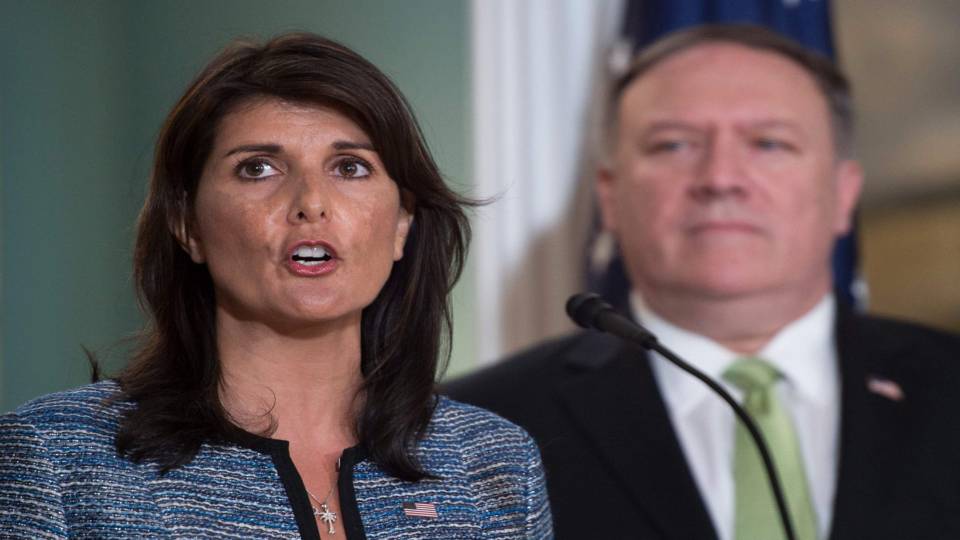US Withdraws from UN Human Rights Council over Perceived Bias Against Israel
The Trump administration withdrew from the United Nations Human Rights Council on Tuesday in protest of what it perceives as an entrenched bias against Israel and a willingness to allow notorious human rights abusers as members.
U.N. Ambassador Nikki Haley, who has sought major changes on the council throughout her tenure, issued a blistering critique of the panel, saying it had grown more callous over the past year and become a “protector of human rights abusers and a cesspool of political bias.” She cited the admission of Congo as a member even as mass graves were being discovered there, and the failure to address human rights abuses in Venezuela and Iran.
“I want to make it crystal clear that this step is not a retreat from our human rights commitments,” she said during a joint appearance with Secretary of State Mike Pompeo at the department. “On the contrary. We take this step because our commitment does not allow us to remain a part of a hypocritical and self-serving organization that makes a mockery of human rights.”
Haley accused governments with woeful human rights records of seeking seats on the council to avoid scrutiny and then resisting proposals for reform.
“When we made it clear we would strongly pursue council reform, these countries came out of the woodwork to oppose it,” she said. “Russia, China, Cuba and Egypt all attempted to undermine our reform efforts this past year.”
The decision to leave the 47-nation body was more definitive than the lesser option of staying on as a nonvoting observer. It represents another retreat by the Trump administration from international groups and agreements whose policies it deems out of sync with American interests on trade, defense, climate change and, now, human rights. And it leaves the council without the United States playing a key role in promoting human rights around the world.
The United States is midway through a three-year term on the council, which is intended to denounce and investigate human rights abuses. A U.S. departure deprives Israel of its chief defender at a forum where Israel’s human rights record comes up for discussion at every meeting, a standing “Item 7” on the agenda.
“By withdrawing from the council, we lose our leverage and allow the council’s bad actors to follow their worst impulses unchecked — including running roughshod over Israel,” said Eliot L. Engel (N.Y.), the top Democrat on the House committee that oversees the State Department.
“However, this administration’s approach when it sees a problem is to take the United States off the field,” he added. “That undermines our standing in the world and allows our adversaries to fill the void.”
But Pompeo was scathing in his assessment of the council, calling it an “exercise in shameless hypocrisy, with many of the world’s worst human rights abuses going ignored, and some of the world’s most serious offenders sitting on the council itself.”
“The only thing worse than a council that does almost nothing to protect human rights is a council that covers for human rights abuses, and is therefore an obstacle to progress and an impediment to change,” he said.
The decision came a day after the U.N. human rights chief slammed the administration’s policy of separating migrant parents from their children after they enter the United States at the Mexican border, calling it “unconscionable” and akin to child abuse.
This is the first time since the Human Rights Council was formed in 2006, replacing the disbanded Human Rights Commission, that a sitting member volunteered to step aside, though Libya was suspended in 2011 after a government crackdown on unarmed protesters.
The United States initially shunned the panel over President George W. Bush’s concerns that so many human rights offenders could be seated through noncompetitive elections for members nominated by their regional colleagues. The Obama administration sought a seat in 2009 in an effort to showcase that human rights were an important aspect of U.S. foreign policy.
Before the United States joined, half the country-specific votes condemned Israel. During the first six years the United States was a member, resolutions critical of Israel dropped to one-fifth. U.S. membership also led to a sharp decrease in the number of special sessions that focused exclusively on Israel’s treatment of the Palestinians.
“It’s true, the Human Rights Council continues to disproportionately focus on Israel,” said Peter Yeo, an official with the United Nations Foundation that connects the organization with private and nongovernmental groups and foundations. “But with U.S. leadership, the attention Israel brought has dropped significantly. U.S. leadership matters. We’re still the only ones with credibility on human rights on the world stage.”
The Trump administration’s irritation with the council makeup and its agenda has been telegraphed with drumbeat regularity by Haley. A year ago, she denigrated it as a “forum for politics, hypocrisy and evasion,” and threatened a U.S. exit if the council did not kick out abusive regimes and remove Item 7, the standing resolution critical of Israel’s treatment of Palestinians. She repeated her ultimatum two weeks ago.
Since 2006, the Human Rights Council has passed more than 70 resolutions critical of Israel, 10 times as often as it has criticized Iran. On one day alone in March, the council passed five resolutions condemning Israel.
The council’s current membership includes 14 countries that are ranked as “not free” by Freedom House: Afghanistan, Angola, Burundi, China, Cuba, Congo, Egypt, Ethiopia, Iraq, Qatar, Rwanda, Saudi Arabia, the United Arab Emirates and Venezuela.
Haley said many countries agree with U.S. accusations of anti-Israel bias on the council and hypocrisy by abusers but would not openly challenge the status quo.
“We gave them opportunity after opportunity, and many months of consultations, and yet they would not take a stand unless it was behind closed doors,” she said. “Some even admitted they were fine with the blatant flaws of the council, as long as they could pursue their own narrow agenda within the current structure.”
Bret Schaefer, a Heritage Foundation scholar who analyzes U.N. actions, called the withdrawal a “measured” response.
“The Trump administration seems to be the only government that seriously wanted the Human Rights Council to promote universal respect and protection of human rights and fundamental freedoms in a fair and equal manner,” he said.
But some questioned whether a U.S. withdrawal will lead to reforms, or further undermine the council’s mission.
“The Trump administration’s withdrawal is a sad reflection of its one-dimensional human rights policy: defending Israeli abuses from criticism takes precedence above all else,” said Kenneth Roth, executive director of Human Rights Watch. “The U.N. Human Rights Council has played an important role in such countries as North Korea, Syria, Myanmar and South Sudan, but all Trump seems to care about is defending Israel.”






















